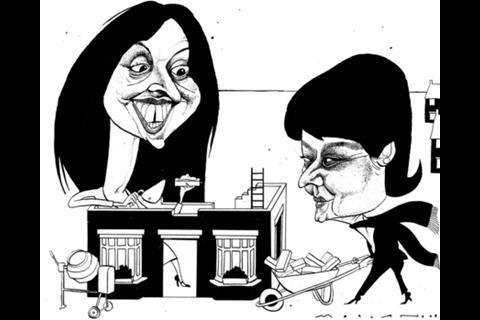So Fortuna’s ever-whirling wheel has brought two new politicians to look after our industry. At first sight they seem like standard issue New Labour middle managers. Probe a little deeper into their biographies, though, and they’re about as similar as Mary Poppins and Lady Macbeth.
Despite her genteel title, it is unlikely that Baroness Vadera will wilt in the face of brawny contractors. The 45-year-old Uganda-born former investment banker has reportedly been a forceful presence in Whitehall since she joined the Treasury in 1999 and became a close adviser to Gordon Brown. The new construction minister’s expertise is said to be in PPPs – she was Brown’s chief negotiator during the part-privatisation of London Underground. However, it seems in her nature to keep a low profile – Bob Kiley, the Transport for London boss, claimed that during the tube negotiations he found her weeping after all the available exits were barred by reporters.
Nicknamed Shriti the Shriek in Whitehall, Vadera has been called the prime minister’s enforcer and, along with Ed Balls, his representative on earth. Her gutsy approach to sensitive issues was highlighted during the demise of Railtrack in September 2001, when she dismissed the company’s shareholders as “grannies who would lose their blouses”.
In the plus column, the former Oxfam trustee’s proximity to Brown is good news for the industry. A Construction Confederation spokesperson said: “It can’t do any harm. We need to look for any advantage we can get when dealing with the government.” Their first meeting is scheduled within 10 days.
In the minus column is the fact that construction is one of 13 sectors she will cover. And as she is the seventh construction minister in as many years, the industry will also be dubious about her shelf-life. Mark Prisk, the shadow construction minister, likened his job to shadowing Doctor Who: “Every six months or so there’s a new face.”
If Vadera’s political biography resembles Lady Macbeth’s, Caroline Flint, the new housing minister, is closer to Mary Poppins.
“Self-righteous”, “goody two-shoes” and a “(barely) human football rattle” are some of the nicer names applied to the Don Valley MP since she was elected in 1997. Perhaps the 46 year old’s best know moniker is that of “Supernanny”, earned from her public health campaigns – although her recently stated desire to evict council tenants who do not look for work may change that perception.
Flint steered the English smoking ban through the House of Commons – admitting along the way to smoking cannabis in the eighties. The mother of three has also spoken out against irresponsible drinking, with middle-class wine gluggers coming in for particular ire. This intervention caused Boris Johnson to accuse Flint of attempting to “stamp her own mark, like Baron Philippe de Rothschild, on every bottle we buy”.
Flint is also known for the informal Westminster poll that found her to be the “most fanciable MP”. She is also a member of the House of Commons dancing troupe the “Division Belles”, and as a girl was taught dancing by Bonnie Langford’s mother.
She will have to be a political performer now, as her role comes with a seat in the Cabinet. The housing industry, though, knows little of the woman who has to deliver 3 million new homes by 2020 and make all new ones zero carbon from 2016. Alan Cherry, the Countryside Properties chairman, says: “I don’t know anything about her. I hope she picks up the baton quickly. Change tends to slow the process down, and we can’t afford that to happen.”
This may, however, prove a blessing for a sector that was growing increasingly frustrated with Yvette Cooper, Flint’s predecessor. One former civil servant said: “I know little about her, but she can hardly be more indecisive than Yvette.”
Another regeneration source said: “She might make a few more decisions. The civil servants were cheering when Cooper left.”
Flint’s own website makes a telling point, however: her interests cover everything from asbos to foreign affairs, but there is no mention of housing or the built environment.
Baroness Vadera
Current position
Undersecretary of state for business and competitiveness
2007-08
Elevated to the House of Lords as Baroness Vadera, undersecretary of state for international development
1999-2007
Appointed one of three economic advisers to Gordon Brown after 14 years at investment bank UBS Warburg
Caroline Flint
Current position
Minister for housing and planning
2007-08
Minister of state, Department for Work and Pensions; minister for Yorkshire and the Humber
2006-07
Minister of state, Department of Health
2005-06
Parliamentary secretary, Department of Health
2003-05
Undersecretary, Home Office
2001-03
PPS to John Reid, minister without portfolio
1999 - 2001
PPS to ministers of state, Foreign Office






























No comments yet